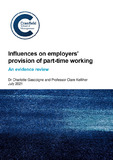- CERES Home
- →
- School of Management (SoM)
- →
- Staff publications (SoM)
- →
- View Item
JavaScript is disabled for your browser. Some features of this site may not work without it.
| dc.contributor.author | Gascoigne, Charlotte | |
| dc.contributor.author | Kelliher, Clare | |
| dc.date.accessioned | 2021-07-30T14:59:26Z | |
| dc.date.available | 2021-07-30T14:59:26Z | |
| dc.date.issued | 2021-07-14 | |
| dc.identifier.citation | Gascoigne C, Kelliher C. (2021) Influences on employers’ provision of part-time working: an evidence review. Cranfield School of Management, Cranfield University, July 2021 | en_UK |
| dc.identifier.uri | https://www.cranfield.ac.uk/som/expertise/changing-world-of-work/the-future-of-part-time-working | |
| dc.identifier.uri | http://dspace.lib.cranfield.ac.uk/handle/1826/16957 | |
| dc.description.abstract | Part-time working accounts for one in five jobs across Europe, and one in four in the UK. However, part-time working from the employer perspective has been under-researched. The employer perspective is important because currently, part-time jobs are often poor quality jobs, and because some full-time workers would prefer to work part-time but feel that the option is not open to them. Better quality part-time jobs across a broader range of types of work could improve labour market participation, social inclusion and progression for certain disadvantaged demographics, which in turn will maximise skills and productivity. Part-time working is defined in relation to a full-time norm, but part-time jobs are not uniform: part-time working may be designed to meet employer needs or workers’ work-life needs; it may be high-quality or low-quality; and it may vary from one day a week to almost full-time. Influences on employers’ provision of part-time working may operate at the national, sectoral, occupational or organisational level. Within organisations, provision may vary depending on the nature of the work and the attitudes of line managers and co-workers. National legislation and cultural expectations provide the context within which employers make their decisions about the provision of part-time working: the prevalence of part-time working across Europe varies from 48% in the Netherlands to less than 10% in many eastern European nations. This context may affect employers in several ways. First, it may affect employer policy – not just the legal rights of part-time workers, but the cultural expectations about ‘the right thing to do’ for demographic groups such as parents and carers. Secondly, it may influence line managers’ views on how to implement employer policy; and thirdly it may affect workers’ preferred working hours, which in turn affect employers’ provision of part-time working. Sectoral and occupational context also influence employer decisions about the provision of part-time working: there is wide variation across sectors and occupations, with much higher prevalence in service sectors and in low-paid, female-dominated occupations in the UK. However, there is insufficient evidence to assess how the nature of the work, the people doing the work, the skills and gender balance in the sector, and the economic position of each sector or occupation contribute to the variable provision of part-time working. At the organisational level, employers, and line managers, must balance the costs of part-time working against the need to attract and retain workers. There are quasi-fixed costs such as recruitment and training, which rise with the number of employees, rather than hours worked, and costs associated with the adaptation of working practices for part-time employees, such as team communication and the coordination of work. There are two principal advantages for employers: using part-time working to match supply and demand for labour during extended operating hours and peak periods, and, where organisational success depends upon the knowledge and talents of the workforce (human capital), using part-time working to attract and retain workers. The perceived productivity of part-time working is also part of the calculation. The Covid-19 pandemic has had a major impact on employer attitudes to flexible working, particularly homeworking. At the same time, the flexible furlough scheme has provided a natural experiment in part-time working. Although the use of short-time working schemes during economic downturns is well established in other developed economies, their impact on longer-term part-time working has received little research attention, possibly because part-time working is often considered from the perspective of workers’ reasons for working part-time, while short-time working schemes are largely involuntary for workers. The redesign of work to facilitate ‘part-furlough, part-working’ may have provided opportunities for managerial and organisational learning: the next stage of this project is to research any changes in employers’ perspectives on the feasibility of part-time working in different types of work. | en_UK |
| dc.description.sponsorship | This research is funded by the Economic & Social Research Council (ESRC), as part of UK Research & Innovation’s rapid response to Covid-19. | en_UK |
| dc.language.iso | en | en_UK |
| dc.publisher | Cranfield School of Management | en_UK |
| dc.rights | Attribution 4.0 International | |
| dc.rights.uri | http://creativecommons.org/licenses/by/4.0/ | |
| dc.title | Influences on employers’ provision of part-time working: an evidence review | en_UK |
| dc.type | Technical Report | en_UK |
Files in this item
This item appears in the following Collection(s)
-
Staff publications (SoM) [1282]

